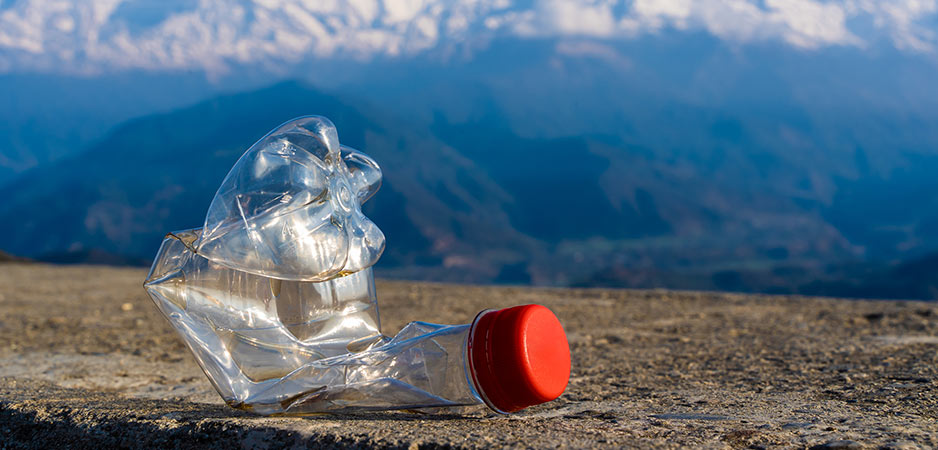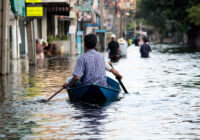In India, many people blame the communities living in and around the forests for exploiting natural resources. They are held responsible for forest degradation and deforestation. Communities who live in the Himalayas are no exception. Today, the once-pristine Himalayan mountains are littered with plastic. Even remote villages with age-old traditions have not escaped the plastic menace. As a result, we are witnessing one of the biggest environmental tragedies in the world.
Solar radiation heats up plastic, a natural heat absorbing material. In a world where climate change is accelerating, plastic further exacerbates the heating up of the mountains. This increase in overall temperature at high altitudes is melting glaciers and creating glacial lakes. The threat of glacial lake outburst flood, popularly known as water bombs, is rising by the day and could affect millions downstream.
Will COVID-19 Help Us End Food Waste?
Plastics also clog innumerable streams, rivulets and rivers. Animals can ingest them and die. They increase the incidence of cancer. They ruin delicate mountain ecosystems for decades if not centuries to come.
Governments have responded by regulating or banning the use of plastic. Their measures have not worked effectively. The public are now increasingly aware of the pitfalls of plastics. They also have a better understanding of how to dispose of them. Yet few bother about the proper disposal of plastics. What is going on?
Tourism and Pollution
About two decades ago, I visited the Kedarnath Wildlife Sanctuary in Uttarakhand in India. It was part of specialized training on wildlife management at the premier Wildlife Institute of India in Dehradun. A group of officers set off for Kanchula Kharak, a scenic spot in the sanctuary, nestled amidst dense forests and verdant vegetation.
As the bus climbed the mountain at a steady speed, we would occasionally stop for tea and snacks as well to engage in photography. At one point, the bus stopped at a cluster of roadside tea shops near a small village. The coolness and freshness in the mountain air were invigorating. In a typically Indian custom, we decided to enjoy the view with chai and pakora, a typically Indian combination of tea and freshly fried food.
We were not alone at the spot. Some tourists were also enjoying the spectacular view of mountain landscapes while quenching their thirst and slaking their appetite. As we were sitting on the benches waiting for our chai-pakora combination, we observed that some of the tourists were drinking soft drinks and eating potato chips. A senior colleague in our group quipped: “See, here also, they are selling soft drinks and chips. They should not sell these items here. The shops should keep local products only. See, the empty plastic bottles and packets are strewn all around, polluting the beautiful mountain forest and environment.”
Our chai-pakora was served soon enough, but my colleague’s words set me thinking. Empathizing with the poor tea shop owners, I instinctively responded, “They are selling soft drinks and chips because tourists are buying.” Although I did not articulate it at that moment, I saw the poor tea shop owner merely supplying what his customers demanded. Not doing so could have meant not making enough money to feed his family.
Suffice to say, my senior colleague differed with me. He offered the supply-side argument. If tea shop owners did not sell soft drinks and plastics, the tourists would not have been able to buy them. These owners were at fault. They had to be stopped.
Being a man of the mountains myself, I know how hard life can be for my people. So, I demurred: “Sir, why do you blame these mountain folks? They are poor and their poverty compels them to sell whatever the tourists demand. It is an opportunity for these mountain folks to earn a livelihood during the brief tourist season before snow and winter set in.” This argument did not wash with my senior who retorted: “Poverty, poverty, poverty … what is poverty? I do not see them starving. In any case, they are destroying the environment everywhere selling these city products.”
Like my colleague, I too am appalled by the pollution. It is disgusting to see the beautiful Himalayan mountainside ruined by plastic. Yet my senior’s condemnation of the tea shop owners does not quite sit easily with me. The old ways of life in Himalayan villages are dead. Communities have weakened. Subsistence farming no longer meets local needs. Money talks. In a market economy, mountain folks have to earn a living. Tourism is the most obvious way for them to make money. A tea shop at a scenic spot brings in regular cash flow that often pays for the year’s expenses. During the snowy days of the harsh winter season, no tourists come and mountain folks make no money. So, why blame these mountain folks?
Just as mountain folks have their needs, so do tourists. They escape to cool and green mountains from hot and dusty cities. They have developed a taste for soft drinks and chips. Lest we forget, these are advertised incessantly on their television sets or computer screens. They want to soak in the scenery while partaking something they enjoy. Surely that is a natural human instinct.
After my conversation with my senior colleague, I kept mulling through the rest of the journey. My contemplation ended when the bus screeched to a halt at Kanchula Kharak. I stepped out into one of the most beautiful landscapes in Uttarakhand and the memory of it is still fresh today. Humanity owes a duty to future generations to preserve such landscapes. They bring us peace, joy, inspiration and much more.
Acting Responsibly
For nearly 20 years, I have been musing on the incident. Neither the tea shop owners nor the tourists can be condemned outright. Today, when I go to remote villages in the mountains, I see more tea shops, tourists and plastic. I think of Adam Smith’s invisible hand of the market that balances supply and demand. Perhaps the answer lies in changing the nature of demand. If tourists were to realize that soft drinks may raise the risk of diabetes, chips to heart attacks and their plastics to ecological destruction, they might reduce their consumption.
Of course, reducing the poverty of mountain folks and generating diverse livelihood options as well as providing incentives to set up environmentally-friendly businesses might also help. Teaching those who run tea shops the art of reducing, reusing and recycling plastic might also help. So would innovative and creative ideas along with determined and persistent action.
Casting blame either on mountain folks or the tourists from the plains is unhelpful and unwise. We can do much better. All of us need to act responsibly.
The views expressed in this article are the author’s own and do not necessarily reflect Fair Observer’s editorial policy.
Support Fair Observer
We rely on your support for our independence, diversity and quality.
For more than 10 years, Fair Observer has been free, fair and independent. No billionaire owns us, no advertisers control us. We are a reader-supported nonprofit. Unlike many other publications, we keep our content free for readers regardless of where they live or whether they can afford to pay. We have no paywalls and no ads.
In the post-truth era of fake news, echo chambers and filter bubbles, we publish a plurality of perspectives from around the world. Anyone can publish with us, but everyone goes through a rigorous editorial process. So, you get fact-checked, well-reasoned content instead of noise.
We publish 2,500+ voices from 90+ countries. We also conduct education and training programs
on subjects ranging from digital media and journalism to writing and critical thinking. This
doesn’t come cheap. Servers, editors, trainers and web developers cost
money.
Please consider supporting us on a regular basis as a recurring donor or a
sustaining member.
Will you support FO’s journalism?
We rely on your support for our independence, diversity and quality.






